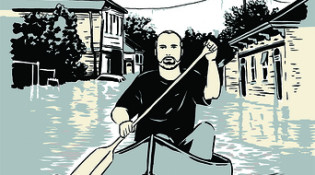On Fiction
Fitting the Form
On September 6, 2005, in an American city convulsing with chaos, an American citizen of Middle-Eastern descent was detained without charge by the U.S. Army, imprisoned indefinitely in a makeshift…
Juneteenth: Ralph Ellison’s Three Days Before the Shooting
With the publication of his first and only complete novel in 1952, Ralph Ellison secured his place at the forefront of American literature and history. Invisible Man was an astounding achievement, not…
Mythomania: Zachary Mason’s Fantasies
Odysseus suffers—if that’s the word for it—from a perpetual fascination with his own cleverness, and The Odyssey thoroughly documents its hero’s indulgence in this fascination: Odysseus constantly dares, playing with…
Soprascarpa di Gomma: Poisonville
In 1929, a year before his classic The Maltese Falcon was published, Dashiell Hammett began his debut novel Red Harvest with these two lines: “I first heard Personville called Poisonville…
Off-beat: Nicholson Baker’s The Anthologist
Nicholson Baker’s The Anthologist is a strange book: part idiosyncratic poetry manual, part disconnected personal narrative. The first line of the novel, if you can comfortably call it that, pulls…
Violence & Evasion: the Novels of Margarita Karapanou
In an interview I once conducted with the Greek writer Amanda Michalopoulou, author of the short story collection I’d Like (Dalkey, 2008), the question of literary precursors came about, and in particular…
Dribbles, Drabbles, Micro- & Flash (Oh my)
Frances Theodora Parsons’ How to Know the Wild Flowers—written under the pseudonym Mrs. William Star Dana, published in 1893, and acknowledged as the first true “field guide”—begins with a brief section…
Enmeshed in War: Evelio Rosero’s The Armies
Colombia is almost certainly among the most difficult places on Earth for an outsider to understand. For forty years, the country has been embroiled in a civil war that pits…
The Closed Circuit Game: a Hippie Noir
The end ennobles every act. — Honoré de Balzac, “The Atheist” But wait, there’s more! — Ed Valenti Thomas Pynchon is too difficult. He is overly tortuous (and torturous). In…


